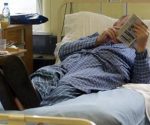The beneficent NHS, where corporate-government makes a buck from population control
In one of the latest efforts to demonise Russia in Britain, Moscow and Putin are being blamed for the decline in trust in vaccines in the UK. It’s a complete fantasy; the trust has waned because people can see and are experiencing the correlation between vaccinations and brain damage in children who have needles inflicted upon them, while at the same time the British Establishment denies the crime, and presents itself to be the abusive, repressive, propagandising tyranny that it is when dealing with the growing clamour of opposition. The British Establishment understands that what is at stake is an issue of destabilisation, because the rejection of vaccines is one small part of an overall dismissal, by a growing section of the public, of what Government asks the people it rules to believe. The UK Government knows that there is going to be a bigger problem because decent folk are finding out that they are being ripped off and lied to systematically, and as part of a control grid that is imposed upon them most callously. It is quite likely that we will see this complete failure of confidence in British Government classified as a matter of national security – and that is why it has to be blamed on Russia now to get the public to turn on itself later. Unfortunately for the British Government, the aforementioned failure is going to be too catastrophic for the blame to stick where it has first been pinned.
The assault by vaccine (by Government design) is a scandal that is the thin end of the wedge when it comes to the disenchantment that is going to be had over the NHS. It is the crown jewel in the Government’s scheme of deception for control. It is presented as a good reason for paying taxes. It is presented as an heroic cause: the nation pulling together, not against a warring opponent, but against illness. Lots of British people – perhaps the majority of them – think that the NHS provides the best healthcare in the world, and it is just delusion.
In truth, the NHS is one of the largest components in the welfare sub-system of the British Government’s silent weapon for control. It is a false capital industry; it has the appearance of being a service, but it is indebtedness that will demand robbery through the taxation of future generations. It is a sink for waste spending to impoverish people now, and to come. The NHS is also a valve for covert population control, as it puts the lives of millions of people directly in the hands of the State. There is a propensity, however, to call death caused by the NHS as “avoidable” brought about by “failure”, and this “oh dear, it was an accident” presentation disguises what being a unit in the NHS process is really all about. In 2016, the Telegraph reported on a 2013 EU study (the reason for the delay is unknown) where “60,000 Britons [were] condemned to avoidable deaths each year due to NHS failings”. The figure is hard to digest, or to believe. Of course, it is argued that the failings are due to a lack of investment, but there is never any lack of investment in the NHS (for anyone to say so is just LibLabCon politicking). The NHS is designed to have taxpayer’s money sunk into it.
The explanation that makes better sense for so many preventable deaths is that the NHS exists for the disguised and deliberate slaughter of “useless eaters” for the purposes of necessary population control in a system transforming from a war-based one, as explained in The Report from Iron Mountain (here), or as the balance to inductance as explained in Silent Weapons for Quiet Wars (here). The reason for making such a statement is that on top of that huge number of deaths per year that could have been prevented, there are, of course, the people in NHS care who die after “everything” is done for them. These losses aren’t considered preventable deaths because of the culture that determined the treatment, but the chances are that in lots of cases of unavoidable death at the hands of the NHS, the treatment wasn’t one that could save the life of the patient. Reportage from the United States tells us that prescription drugs have become one of the leading causes of death in that country, and so there is an emerging and undeniable problem with prescription drug safety. People who die unavoidably at the hands of the NHS will undoubtedly have been subjected to drugs, or other treatment, that, as well as not being fit to cure a particular condition, actually exacerbate it.
And so, the growing vaccine-damage awareness is the tip of the iceberg when compared with the potential for public discovery of how the NHS is institutionally not only not fit for purpose, but a weapon against them. To begin to look at what should be the scandal of the millennium, this article will focus on a common way that sucks people into a decreasing spiral towards ill health and death – or how the NHS finds grist for the mill.
The NHS claims – and appears correct to do so – that obesity is a causal factor of high blood pressure and type 2 diabetes, both of which can lead to such illness as kidney failure, heart disease and stroke, heart attack, eye disease, amongst other things. Other risk factors for an array of illnesses are mentioned on NHS’ websites, but obesity appears to be the big enemy because it is a growing phenomenon, that is potentially easy to deal with, as well as the root of other illness. Dealing with obesity, so the line of reasoning goes, would improve the efficiency of the NHS. In May 2017, the Express reported that “more than £1 billion is spent every year by the NHS on drugs to combat conditions brought on by obesity”.
Indeed, the author finds anecdotally and by experience that the NHS appears to be obsessed with dealing with obesity as a means to prevent costs – and also that this is actually a false presentation, or a front. For the truth appears to be that obesity provides the NHS with an opening opportunity to capture clientele, and to create customers for the big pharma medications that are central to the treatment of obesity itself, and other conditions that come from complications. We can say this because although the NHS does give advice about what is truly necessary to cure obesity – which is a change in an aspect of lifestyle – it is often the wrong advice that will cause worsening illness. Moreover, once patients are on certain medication, any positive elements of NHS lifestyle advice are then offset – or are at risk of being so – by the detrimental effect of the medication (side effects are a common feature of all the medicine for the illnesses which are to be the focus of this article). Nothing suggests that medication does not exist to provide a cure more than patients who have to take medicine for the rest of their lives.
The reader may have heard of the “health freedom” movement, which is about awareness of nutrition-based preventative medicine that we can loosely describe as being rooted in the evidence that food causes or cures bad health. The people who promote this can show on a chemical level why the human body behaves in a certain way whereby it is understood to be presenting bad health. Compared with this, the medical establishment – the NHS – with its cut and burn treatment strategies, is completely barbaric, and is often a mystery to its patients.
What follows is a brief explanation of natural treatment for obesity itself, and also two conditions that are obesity-linked: high blood pressure (hypertension) and type 2 diabetes. In each case, to provide the necessary contrast, there will be an example of what the NHS prescribes in way of lifestyle change to show how it is wrong. The source for the nutritional approach is the Dr Mercola website.
Obesity
The most striking thing that Mercola says about obesity is that the idea that it is caused by a lack of exercise is a myth. Obesity is caused by inappropriate food choices, and the “eat less, exercise more” remedy is actually blame-shifting by food companies who pack their products full of the very stuff that causes obesity.
A poor diet, says Mercola…
is one that is high in processed foods, added sugars (especially processed fructose), harmful fats (vegetable oils and trans fats, not saturated fats or cholesterol found in whole foods) and artificial ingredients.
After a lifetime of being told that all fat is bad, the big surprise for a British audience might be that some fat is actually good:
As a general rule, if the fat is found in a whole food, it’s going to be good for you. This includes the fat found in meat, eggs, raw dairy, avocados, nuts, coconuts and more. It’s the fats found in processed foods you need to be leery of, along with vegetable oils for cooking, margarines and vegetable oil spreads.
As mentioned above, the nutritional approach can justify itself through showing chemical or biological cause and effect. Here’s an example of the rationale made available to the self-healing patient, this time explaining why calorie counting does not work:
Calories from carbohydrates (think sugars and grains) raise your insulin level and turn to body fat, whereas dietary fats [see above] and protein have very little impact on your insulin, and dietary fats are a far more efficient fuel for your body than sugar.
In contrast, the NHS absolutely promotes calorie counting, and exercise – and also (amongst other things – these are the highlights in terms of contradicting the recommendations of the nutritional approach) the following: “plenty of potatoes, bread, rice, pasta and other starchy foods (ideally you should choose wholegrain varieties)”. All these foods are unhealthy choices, as we are going to see in stages throughout this article; here is the first, again from Mercola:
Whole grains are supposed to help you lose weight. They don’t. Whole grains are just as fattening as other grains. Grains and starches are rapidly converted into glucose (sugar) in your digestive tract, and are among the foods you should eat as little of as possible if you’re struggling with excess weight. Low-fat foods are also supposed to help you lose weight.
They don’t. Low-fat foods are typically very high in sugar, and sugar is what makes you pack on excess weight, and prevents your body from burning body fat.
The next stage in NHS treatment of obesity is the drug Orlistat [about which the NHS says]:
Treatment with orlistat must be combined with a balanced low-fat diet and other weight loss strategies, such as doing more exercise. It’s important that the diet is nutritionally balanced over three main meals.
It should be clear to the reader what the problem is here. The dietary advice is completely wrong. What’s more, the medication is changing bodily function to extract fat. Moreover, according to Mercola, Orlistat may produce toxicity in internal organs and “has been linked to severe liver failure, acute pancreatic failure and acute renal (kidney) failure.” Even with the treatment of obesity being recognised as a money-saving necessity for a long time, in 2016 we discover that, “NHS England said around £16 billion a year is spent on the direct medical costs of diabetes and conditions related to being overweight or obese.”
Does it look like the NHS is preventing obesity?
Type 2 Diabetes
Type 2 diabetes is exploding. In October 2016, it was reported that the NHS spent £10 billion on treating types 1 & 2 diabetes (90-95% of sufferers have the entirely curable type 2 form of the disease). This amounted to 10% of the NHS’ budget. It is believed that costs could hit £17 billion in 2035 – some say that diabetes will bankrupt the NHS.
The Mercola site insists that the underlying cause of type 2 diabetes is “impaired insulin and leptin sensitivity”. Naturally, as captives of the NHS, British people won’t have heard of this. Obesity and hypertension do indeed contribute as conditions that make the abovementioned failures more likely to happen, but the big and perhaps unexpected point is that type 2 diabetes is not a disease of blood sugar. This undermines the NHS doctrine that the disease is treated by maintaining normal blood glucose levels.
The following rationale is from the Mercola website:
Insulin… regulat[es]… your glucose at the levels your body needs to live.
Leptin is a hormone produced in your fat cells. One of its primary roles is to regulate your appetite and body weight… leptin is responsible for the accuracy of insulin signalling (sic) and for your insulin resistance… [so leptin affects performance of insulin]
…obesity can cause a resistance to leptin — in other words, the signaling (sic) pathway for leptin becomes skewed in obese people, causing the body to over-produce leptin just as it does glucose when you are insulin-resistant…
Thus, the primary role of insulin is NOT to lower your blood sugar, but to store the extra energy (glycogen, a starch) for present and future consumption. Its ability to lower your blood sugar is merely a “side effect” of this energy storage process. Ultimately, what this means is that diabetes is both a disease of insulin and of a malfunction in leptin signaling.
And that’s why “treating” diabetes by merely concentrating on lowering blood sugar can be a dangerous approach. It simply does not address the actual issue of metabolic miscommunication that’s going on in every cell of your body when your leptin and insulin levels are disrupted and stop working together the way they should.
The following is how Mercola recommends that patients treat their own type 2 diabetes:
Eliminate ALL sugars and grains – even “healthful” ones like whole, organic, or sprouted grains – from your diet. Avoid breads, pasta, cereals, rice, potatoes, and corn (which is, in fact, a grain). Until your blood sugar gets under control, you may want to restrict fruits as well… Besides fructose, eliminate trans fats [vegetable fats], which increase your risk for diabetes and inflammation by interfering with your insulin receptors.
Vitamin D is also prescribed. In contrast, here are the (unhealthy) highlights of the NHS advice:
Increase your consumption of high-fibre foods, such as wholegrain bread and cereals, beans and lentils, and fruit and vegetables… Choose foods that are low in fat – replace butter, ghee and coconut oil with low-fat spreads and vegetable oil
There are umpteen drugs available on the NHS to treat type 2 diabetes by lowering glucose levels in various ways – and if all that fails, then there is the ultimate measure of taking insulin to increase its levels in the body. Notwithstanding the side effects of these drugs (as reported on the Mercola website – please look them up), the NHS just doesn’t deal with the underlying causes.
Blood pressure
Here is the advice from the Mercola website about self-curing hypertension:
Replace most of your carbs with non-starchy vegetables and replace the lost calories with healthy fats [from, for instance, olives, olive oil, coconut oil, butter (raw milk), nuts, avocados]… Consuming omega-3 fats [fish and animal products] is one of the best ways to re-sensitize your insulin receptors if you suffer from insulin resistance.
The NHS advice on what food to eat in a lifestyle change is minimal and focuses on taking less salt (which the reader can see hasn’t featured in the Mercola advice copied to this page), and again eating that unhealthy low fat diet.
Mercola has plenty of material about the side-effects, sometimes lethal, of drugs for blood pressure. And yet, the NHS website has a rather worrying line:
You can take these steps [(lifestyle changes)] today, regardless of whether or not you’re taking blood pressure medication. In fact, by making these changes early on you may be able to avoid needing medication…
You may need to take blood pressure medication for the rest of your life. But your doctor might be able to reduce or stop your treatment if your blood pressure stays under control for several years.
And so, if the NHS gets you as a blood pressure patient – and in 2014, 25% of the population were affected with hypertension – it theoretically means drugs for evermore because the NHS provides no effective nutritional treatment.
So much for creating a captive client base. We look next at how the NHS comes by the drugs it gives to its patients. Drugs and treatment are approved by the European Medicines Agency (EMA), and then the UK’s National Institute for Health and Care Excellence (NICE) – the author isn’t aware of how much influence the EMA has over NICE, and it would be an interesting exercise to find out. The only way the NHS can use drugs or treatment that aren’t licensed in this way is as part of a research trial, or if the patient pays for the service themselves. There is a case at the moment where Novartis and Bayer, two of the world’s biggest pharmaceutical companies, might be going to sue 12 NHS health boards in Cumbria and North-East England for using a drug that isn’t licensed. In actual fact, the medicine in question, Avastin, is licensed as a breast cancer drug, but has an application in the treatment of a particular eye disease. It is much cheaper than the drugs produced by Novartis and Bayer that are licensed for the same purpose, and the NHS wants to save money by using it. This has caused a problem.
The Mail, covering the case, reports the following:
A spokesman for Bayer said: ‘The principle of using unlicensed medicines when licensed and NICE-approved options are available runs the risk of setting a precedent that undermines the regulatory framework and NHS constitution. ‘Bayer is currently considering its position including the possibility of legal proceedings.’
Here is a situation where the NHS could use a cheaper drug, but can’t automatically (if at all) because of regulations, and initially because of NICE preferment. What do we learn from this? If there is a stitch-up between government and a few big pharmaceutical companies, then the latter can effectively rig the market that the NHS services. The NHS is vulnerable, therefore, to having the cost of drug and treatment set at the supply end, rather then the demand. The usual rules of economics say that if there is more demand, then a product should be cheaper. This is clearly not the case in the NHS, and we should perhaps say that not only is the NHS vulnerable to it, but the abuse of tax payers money has been achieved. But of course, a product, whatever its price, needs a customer, and the NHS is clearly complicit in roping people in, and trapping them there, to consume what its big pharma partners produce. The corruption is not going to be exposed any time soon, and so it behoves Britons to keep themselves out of the clutches of the NHS by natural remedies, and eating the right sort of food.
Returning to the topic by which this article was introduced, it is very significant that the accusation that Russia was encouraging vaccine-scepticism by cyber-warfare came from a former head of the National Counter Terrorism Security Office:
He told the Mirror today: “This is all about destabilisation by external forces. War is ever changing and becoming much more cyber-based.
“For generations, governments in the UK and the West have been extremely worried about destabilisation from external forces.
“The Russians have long felt that the UK, America and the European Union is a major threat to them so have developed major strategies in how to interfere with politics, policy, and now it seems the interference is impacting on vital decisions in our daily lives.”
What is at stake is the corporate-government buck and its silent weapons system, but it isn’t Russia that is destabilising to threaten it, it is the British people. Although it’s useful in case of a requirement to go to war, the use of the Russians as a scapegoat is actually code, because where the threat is really coming from cannot be allowed to be a news reality. The smiley-faced dictatorship that rules the UK is, as far as so many badly deceived people are concerned, beyond inspiring reaction amongst countrymen who see it as a danger to their lives. As has been written of at FBEL before, opposition to the totalitarian state is terrorism as far as it is concerned, and this is why a counter-terror operative is interested in how Britons are protecting themselves from vaccine assault. As for the sheeple, they must be kept on the plantation because the acceleration of their appreciation of who is really upsetting the dictatorship’s apple cart [not the Russians], and for what good reason it is being done, is inversely proportional to the power that the UK Government is losing. Imagine the trouble there will be for the Government when the failure of public confidence expands from trust in vaccines, to trust in the NHS in its entirety.


















